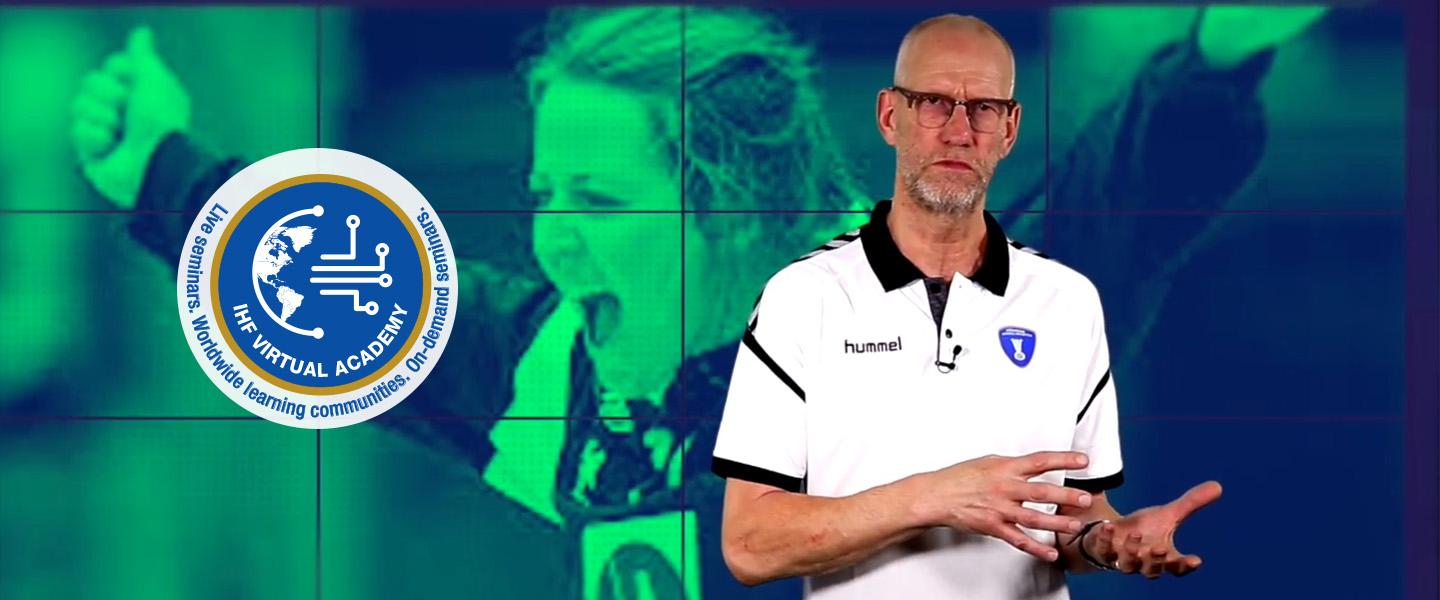New refereeing and goalkeeper coaching seminars on IHF Education Centre
16 Sep. 2020

IHF experts have been hard at work creating a number of new on-demand e-learning seminars, which have recently been added to the IHF Education Centre. The new seminars primarily focus on refereeing, but there are also seminars related to goalkeeper coaching as well as fitness and nutrition. Access to these seminars is free upon creating a profile. All videos can also be found on the IHF Education Centre YouTube page.
The specific topics addressed in the new seminars are outlined below.
COACHING
Goalkeeping – The Mental Game!
Mats Olsson, IHF Commission for Coaching and Methods member and goalkeeper coach of the Norway women’s and Sweden men’s national teams
Languages: English, Spanish
In a seminar divided into three parts, Olsson emphasises the need for specialised goalkeeper coaches in handball teams. First, Olsson discusses the need to incorporate tactical and mental elements into the training programmes, alongside drills and exercises.
In part two, Olsson explains four specific methodological elements relevant for long-term development: simple technique training, complex technique training, reading the shot and reading the game.
Part three focuses on the mental preparation of goalkeepers, including varied elements such as control of tension, charisma, finding the flow, strategies for reading the game, psychology against opponents, staying cool and concentrated, and focus and refocus. Olsson sees these elements as key for success in goalkeeping.
Find the seminar here (registration required).
REFEREEING
Progressive line – part 2: How to control the pivot zone (including test)
Ramon Gallego, IHF Playing Rules and Referees Commission Chairman
Language: English
The pivot zone, between the six- and nine-metre lines, is where many problems occur during a match. This seminar, following on from the previously published Progressive line – part 1, focuses on how to properly apply the progressive line around the pivot zone. The seminar is broken into four parts: introduction, basic principles – how to use the progressive line in the pivot zone, how to properly use the progressive line and guidelines.
Find the seminar here (registration required).
Part 1 of the series is also available for free on the IHF Education Centre website.
Body language – the key of modern refereeing style
Angel Sabroso and Oscar Raluy, IHF referees
Languages: English, Spanish
During a match, referees must be able to communicate their decisions effectively. With the increasingly fast, tactical and spectacular nature of modern handball, the refereeing communication techniques must be expanded. It is not only the decisions that must be communicated effectively, but the reasons for those decisions, and it is here that body language has a particular relevance and becomes a critical object of study and work for referees.
Strong use of body language can assist with various elements such as sending clearer messages to teams, showing players what is allowed from the beginning, controlling the match more effectively and making the rules understandable to all spectators and others around the match.
In these ways, good body language from referees can help handball develop into a more spectacular game.
Find the seminar here (registration required).
Attacker faults and provocations/overreactions – part 1: general criteria (including test)
Ramon Gallego, IHF Playing Rules and Referees Commission Chairman
Languages: English, Spanish
A consistent line from referees concerning the assessing and calling of offensive fouls greatly impacts the quality of a match. In this seminar, IHF Playing Rules and Referees Commission Chairman Ramon Gallego uses video clips of one-on-one and breakthrough situations of back-court players as well as typical fouls committed by line players to explain the general criteria for punishment of such actions.
In addition, Gallego looks at the tendency for provocations and overreactions from both attackers and defenders, which are committed by players with a goal of forcing certain decisions from referees. The IHF PRC find this tendency to be highly negative, as it is unsportsmanlike and also makes it difficult for referees to clearly observe situations. Gallego therefore explains the IHF criteria for punishment in these scenarios.
The seminar is divided into four parts: introduction, basic criteria for an offensive foul, provocations/overreactions and summary.
Find the seminar here (registration required).
PHYSICAL FITNESS AND NUTRITION
Physical preparation for IHF referees (including test)
Dani Arino and Sergi Cedrun, IHF athletic coaches
Languages: Spanish, English subtitles
As handball becomes faster and faster, referees must adapt. The speed of the game impacts referees’ methods of training and their general physical preparation. Therefore, this seminar focuses on tools to achieve the physically optimum conditions that meet the demands of modern handball.
Find the seminar here (registration required).
Nutrition for handball referees (including test)
Sergi Cedrun, IHF athletic coach
Languages: English, Spanish
Nutrition is a critical element in helping referees to reach their best level of performance. Every sport has its own nutritional expertise to achieve the highest level of physical condition, and the same is true of handball refereeing. This seminar offers advice to help referees be energetically ready and fit for the demands of modern handball.
Find the seminar here (registration required).

